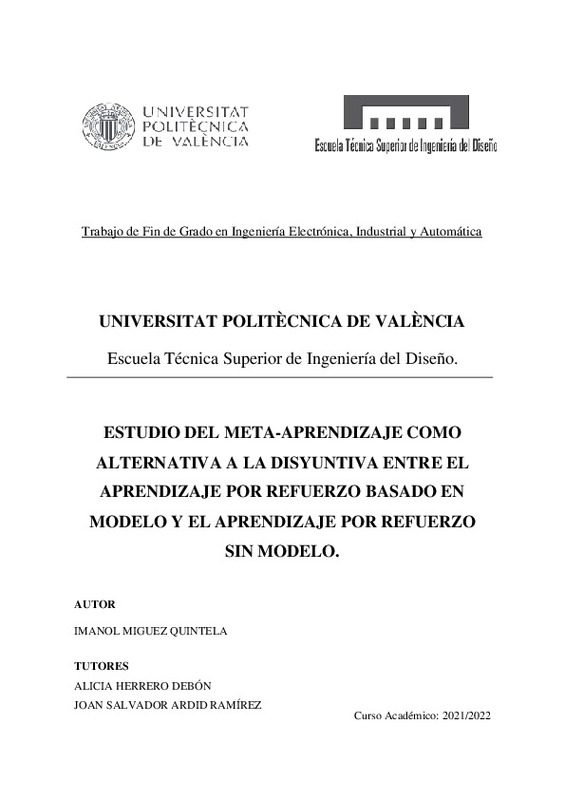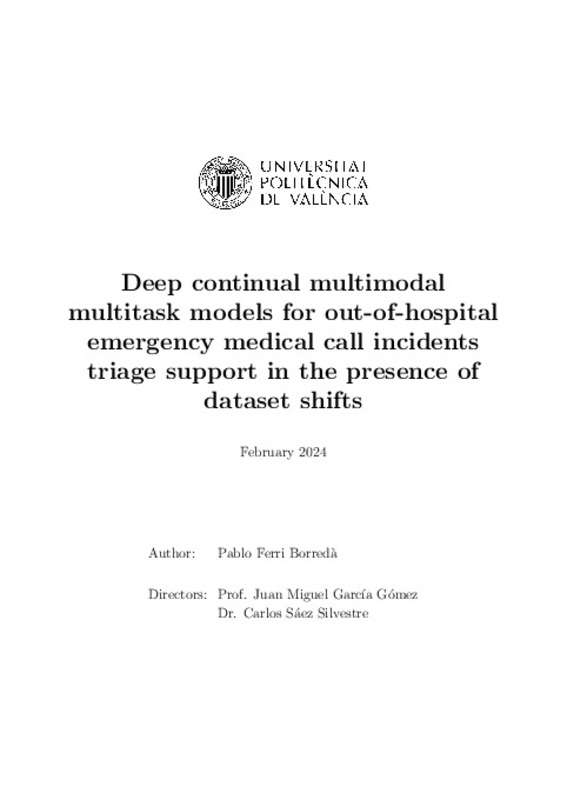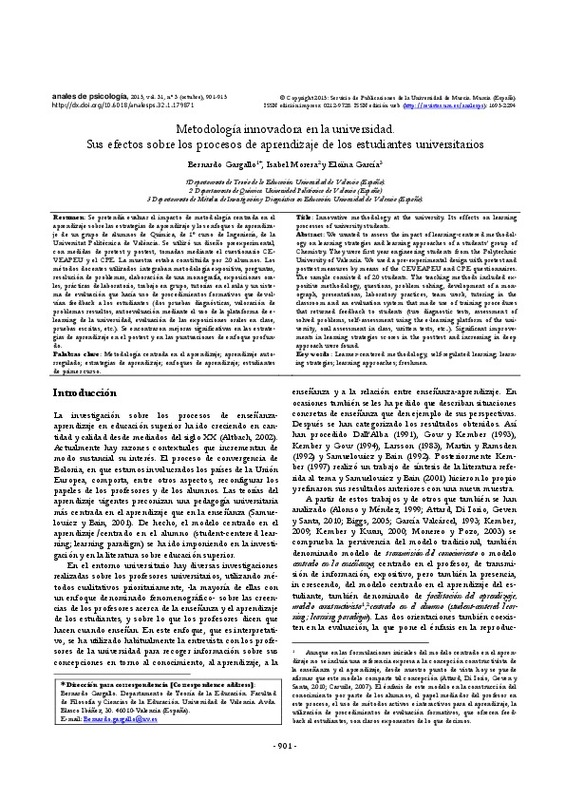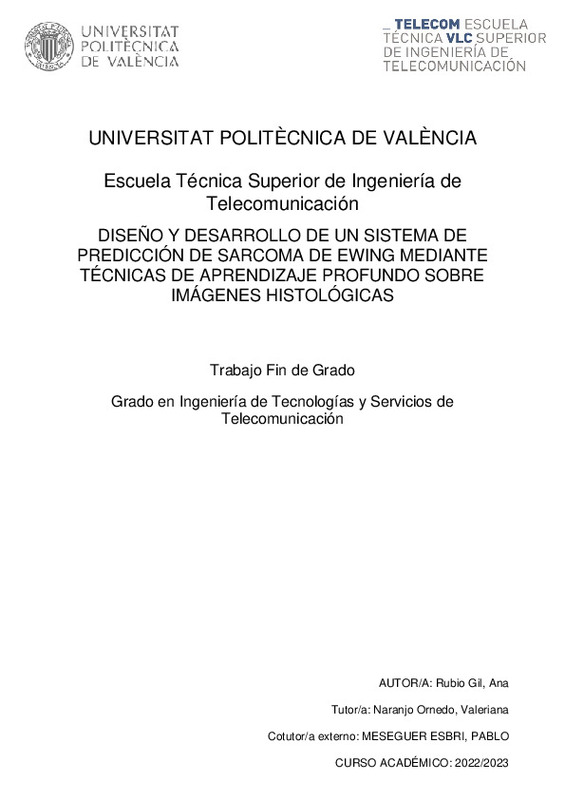JavaScript is disabled for your browser. Some features of this site may not work without it.
Buscar en RiuNet
Listar
Mi cuenta
Estadísticas
Ayuda RiuNet
Admin. UPV
Estudio del meta-aprendizaje como alternativa a la disyuntiva entre el aprendizaje por refuerzo basado en modelo y el aprendizaje por refuerzo sin modelo
Mostrar el registro sencillo del ítem
Ficheros en el ítem
| dc.contributor.advisor | Herrero Debón, Alicia
|
es_ES |
| dc.contributor.advisor | Ardid Ramírez, Joan Salvador
|
es_ES |
| dc.contributor.author | Miguez Quintela, Imanol
|
es_ES |
| dc.date.accessioned | 2022-06-09T06:44:42Z | |
| dc.date.available | 2022-06-09T06:44:42Z | |
| dc.date.created | 2022-05-25 | |
| dc.date.issued | 2022-06-09 | es_ES |
| dc.identifier.uri | http://hdl.handle.net/10251/183145 | |
| dc.description.abstract | [ES] Se comparará la eficiencia, ventajas y desventajas, de diferentes algoritmos de aprendizaje por refuerzo ("reinforcement learning", RL), tales como el refuerzo basado en modelo (model-based RL), el refuerzo sin modelo (model-free RL), el refuerzo híbrido (que surge de combinar los algoritmos con y sin modelo, hybrid model RL) y una alternativa a estos, basada en meta-aprendizaje. La optimización de los diferentes algoritmos se hará en base a dos contextos distintos: por un lado cuando lo que se pretende es maximizar la recompensa, y por otro lado, cuando se pretende reproducir el comportamiento humano a través de su desarrollo cognitivo | es_ES |
| dc.description.abstract | [EN] In this TFG, I will analyze and compare the performance, advantages and limitations, of the following reinforcement learning (RL) algorithms: model-based RL, model-free RL, a hybrid RL algorithm that arises from combining the previous two, and an alternative RL algorithm based on meta-learning. These RL algorithms will be optimized, either according to reward maximization, or by the extent to which each RL algorithm is capable of accounting for human behaviour throughout cognitive development. | es_ES |
| dc.format.extent | 52 | es_ES |
| dc.language | Español | es_ES |
| dc.publisher | Universitat Politècnica de València | es_ES |
| dc.rights | Reserva de todos los derechos | es_ES |
| dc.subject | Algoritmo SARSA | es_ES |
| dc.subject | Análisis de datos | es_ES |
| dc.subject | Aprendizaje automático | es_ES |
| dc.subject | Aprendizaje reforzado | es_ES |
| dc.subject | Aprendizaje por refuerzo | es_ES |
| dc.subject | Diferencia temporal | es_ES |
| dc.subject | Data analysis | es_ES |
| dc.subject | Machine learning | es_ES |
| dc.subject | Model-based | es_ES |
| dc.subject | Model-free | es_ES |
| dc.subject | Reinforcement learning | es_ES |
| dc.subject | Temporal difference | es_ES |
| dc.subject.classification | FISICA APLICADA | es_ES |
| dc.subject.classification | MATEMATICA APLICADA | es_ES |
| dc.subject.other | Grado en Ingeniería Electrónica Industrial y Automática-Grau en Enginyeria Electrònica Industrial i Automàtica | es_ES |
| dc.title | Estudio del meta-aprendizaje como alternativa a la disyuntiva entre el aprendizaje por refuerzo basado en modelo y el aprendizaje por refuerzo sin modelo | es_ES |
| dc.title.alternative | Study of meta-learning as a way out to the alternative between model-based reinforcement learning and model-free reinforcement learning | es_ES |
| dc.title.alternative | Estudi del meta-aprenentatge com alternativa a la disjuntiva entre l'aprenentatge per reforç basat en model i l'aprenentatge per reforç sense model | es_ES |
| dc.type | Proyecto/Trabajo fin de carrera/grado | es_ES |
| dc.rights.accessRights | Abierto | es_ES |
| dc.contributor.affiliation | Universitat Politècnica de València. Departamento de Matemática Aplicada - Departament de Matemàtica Aplicada | es_ES |
| dc.contributor.affiliation | Universitat Politècnica de València. Escuela Técnica Superior de Ingeniería del Diseño - Escola Tècnica Superior d'Enginyeria del Disseny | es_ES |
| dc.description.bibliographicCitation | Miguez Quintela, I. (2022). Estudio del meta-aprendizaje como alternativa a la disyuntiva entre el aprendizaje por refuerzo basado en modelo y el aprendizaje por refuerzo sin modelo. Universitat Politècnica de València. http://hdl.handle.net/10251/183145 | es_ES |
| dc.description.accrualMethod | TFGM | es_ES |
| dc.relation.pasarela | TFGM\138887 | es_ES |
Este ítem aparece en la(s) siguiente(s) colección(ones)
-
ETSID - Trabajos académicos [8906]
Escuela Técnica Superior de Ingeniería del Diseño









